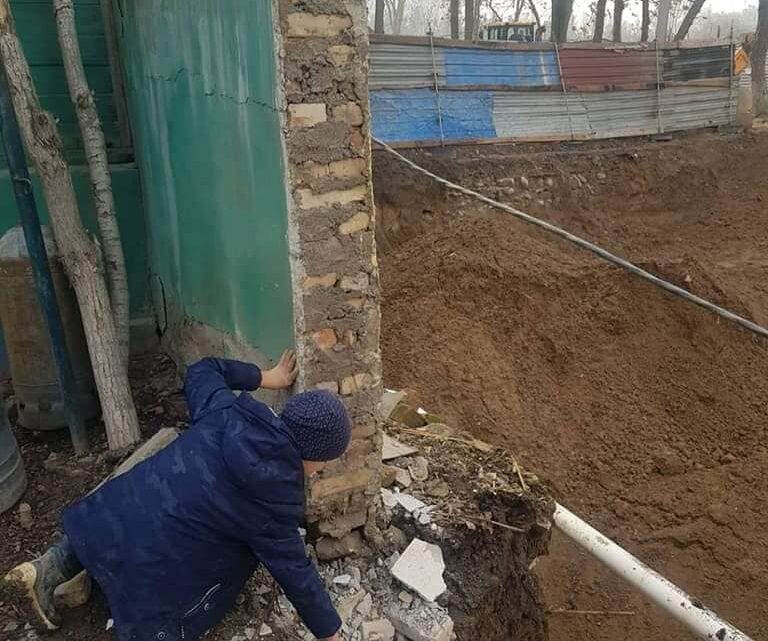Will the Government of Uzbekistan Continue the Practice of Forced Evictions?
19.10.2021By Farida Sharifullina
Last summer, the Uzbek Agency for Information and Mass Communications (AIMK) hosted a briefing on amendments to laws protecting private property during demolitions.
Deputy Justice Minister Akbar Tashkulov reminded that private property had been yet protected by the following laws:
- Constitution, Articles 36, 53-54;
- Law “On Property in the Republic of Uzbekistan”;
- Law “On Protection of Private Property and Guarantees of Owners’ Rights”;
- Law “On Privatization of Non-Agricultural Land Plots”;
- Civil Code;
- Code “On Administrative Liability” and the Criminal Code.
The deputy minister gave such information about violations in 2016-2020:
- 846 cases of demolition without warning;
- 1,388 cases of demolition with non-compliance with the warning period;
- 1,244 cases of demolition without prior assessment;
- 430 demolitions without compensation.
In 2016-2019, 6,479 private properties were demolished for state and public needs and the amount of unpaid compensation reaches 335.6 billion soums (=$31.6 million.). In 2020, 263 properties were demolished for a total compensation of 99.4 billion soums (=$9.4 million).
The new bill proposes, among other things:
- Publication of lists of territories falling under demolition;
- The procedure for preliminary discussion with owners and obtaining their consent;
- Deadline for leaving one’s property: within 6 months of receiving compensation;
- Payment of additional moral compensation in the amount of 5% of the value of the property;
- Indexation in case of delay in payment of compensation;
- In compensation for housing must take into account the social norm (not less than 16 square meters).
We should add that, at the moment (October 2020), such a law has not yet been adopted
The briefing was attended by activists from the “Tashkent SNOS” group on Facebook .
I was interested in the issue of forced evictions.
The Uzbek legislation does not contain a single norm, according to which a law-abiding homeowner can be deprived of his private property right. However, the Uzbek judges make decisions on eviction using either the Article 71 of the Housing Code, which describes the eviction from municipal housing, or judges do not specify at all the norm under which a citizen is deprived of his property (sic!).
Accordingly, the procedures for forced evictions are not described in the procedural legislation. And as a result, evictions take place in the harshest and most brutal manner, with concentration of representatives of law enforcement agencies, with cutting of gates and breaking down of doors. The Bureau of Forced Execution under Prosecutor’s Office (BFE) is responsible for eviction procedures. During eviction, they don’t take into account the weather conditions, the health of the evicted persons, their marital status (for example, it is very easy to evict women with children, pregnant women, etc.).
Also, forced evictions take place at a time when the owner is still in the process of challenging court decisions on eviction. For example, Tashkenti woman Mavjuda Mamatkasymova has filed a cassation appeal to the Supreme Court, but the BFE officers didn’t wait for the Suprem Court decision and proceeded this very hard and brutal eviction last March. Two weeks after that, Mavjuda died.

Mavjuda Mamatkasymova, who died after being forcibly evicted out of her own apartment
When I asked whether the new legislation would describe the procedures for forced evictions, and whether the health status and marital status of the victim would be taken into account, as well as weather conditions, there was no normal answer. The Deputy Minister of Justice tried to say that there would not be forced evictions, there would be forced buyouts. But the Uzbek law prohibits forced transactions! From the lack of an answer, we concluded that Uzbek lawmakers are not going to regulate forced evictions in any way.
Judge of the Supreme Court Nodira Khakimova, who was present at the presidium, tried to stop talking about forced evictions, arguing that the briefing was devoted to legislative reforms and not to “all kinds of private cases”. However, life consists of private cases, and the law reforms should take them into account. So we told her.
Ironically, Nodira Khakimova was among those judges who evicted an other Tashkenti woman Olga Abdullaeva from her own home. (Принудительные выселения в Узбекистане: история борьбы Ольги Абдуллаевой (asiaterra.info) )
This was when she was a judge of the Tashkent City Civil Court:
“Khakimova Nodira is very familiar with my case, at the appeal process in the Tashkent City Court for Civil Cases, since November 2019. It was she who considered my case as part of the panel chaired by Judge Salakhutdinov. She put her signature on the decision to evict me. It was she, Khakimova Nodira, who on March 13, 2020 made the illegal decision to evict me… It was after this decision that the BFE officers broke down my gate and unloaded my belongings into the builder’s car. And this was all during the Covid lockdown period, when the Supreme Court was not accepting the application. Everyone worked through the post office, and the letters to the prosecutor’s office came back four months later unopened. But during the lockdown I could be evicted…”, – says Olga Abdullaeva.
By the way, Nodira Khakimova is not the only judge who was promoted after the process of demolition of the house of Olga Abdullaeva. Judge M. Zakirova from Mirabad inter-district court, who had ordered to evict Olga, was “promoted” to the Tashkent City Court. She made this landmark decision with the words “I do not have a law by which I can evict you, but I will evict you”. Whether there is any causal connection between the forced eviction of Abdullaeva and the career of these judges, we do not know. Perhaps it is just a coincidence.

Olga Abdullaeva
At the briefing Olga Abdullaeva outlined her vision of the problem:
“According to Articles 53 and 54 of the Constitution of the Republic of Uzbekistan, as well as Articles 164 and 166 of the Civil Code of the Republic of Uzbekistan private property is inviolable, protected by the state and the owner can possess, use and dispose of his property at his own discretion.
Paragraphs 2 and 3 of the Explanation of the Supreme Court Plenum “On judicial practice in housing disputes” No. 22 dated 14.09.2001 and “On judicial practice in disputes related to ownership of an individual construction house” No. 14 dated 24.09.2004 state that courts have no jurisdiction over claims related to purchase and sale of private property.
Courts, when resolving housing disputes, must determine the legal status of the housing, its belonging to a private or public housing fund. While filing such claims, the courts should turn down the application on the basis of §1 of part 1 of article 194 of the Civil Procedural Code. In case of initiation of a civil case, the courts should stop the proceedings on the basis of §1 of article 124 of the Civil Procedural Code (§3 of the aforementioned decree of the Supreme Court).
Given that disputes on the seizure of private property in favor of private legal entities are not under the jurisdiction of the courts, all decisions to seize private property in favor of a legal entity were taken in violation of procedural and substantive law, i.e. de jure, they are at least illegal.
Consequently, the courts that made the decisions to seize private property in favor of another private entities violated, at a minimum, the following articles of the Uzbek Penal Code, such as:
- Art. 1921 “Violation of the Right to Private Property”;
- Article 205 “Abuse of power or official authority
- Article 206 “Exceeding power or official authority
- Article 231 “Issuance of an unlawful sentence, decision, determination or ruling”.
All the above-mentioned articles of the Criminal Code are in conjunction with Part 3 of Article 21 of the Law “About Courts”.
Court decisions on seizure of private property in favor of a private legal entity fall under the definition of corruption, given in Article 3 of the Law “On Counteracting Corruption”.
In addition, the courts may consider only claims for seizure of land plots for state and public needs (not aimed directly at the seizure of property from the owner), provided for in Article 37 of the Land Code.
At the same time, in accordance with §4 part 3 of Regulation № 97 of the Uzbek Cabinet of the Ministers dated May 29, 2006, which was in effect until November 2019, “after the khokims of districts (cities) made a decision to withdraw the land plot and demolish residential, industrial and other structures, facilities and plantations located on the land plot, the above residential houses (apartments), structures, facilities and plantations shall not be alienated to other persons“.
Olga then asked questions that went unanswered:
“Considering the above, what actions will be taken by the leadership of the Supreme Court and the General Prosecutor’s Office in relation to the judges who grossly violated the inviolability of private property guaranteed by the Uzbek Constitution?
How and at whose expense the courts will compensate the losses of the owners, from whom the private property was illegally seized?
Will the judges who have knowingly made unjust decisions be held criminally liable under Articles 1921, 205, 206 and 231 of the Criminal Code of Uzbekistan on the basis of Article 18 of the Constitution which states that all are equal before the law”?

